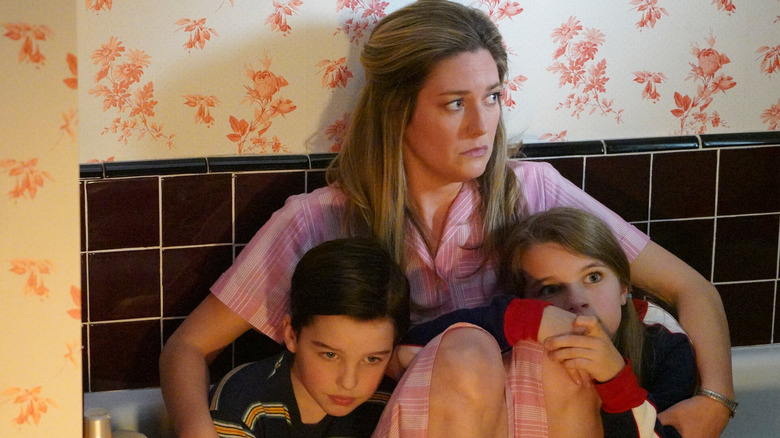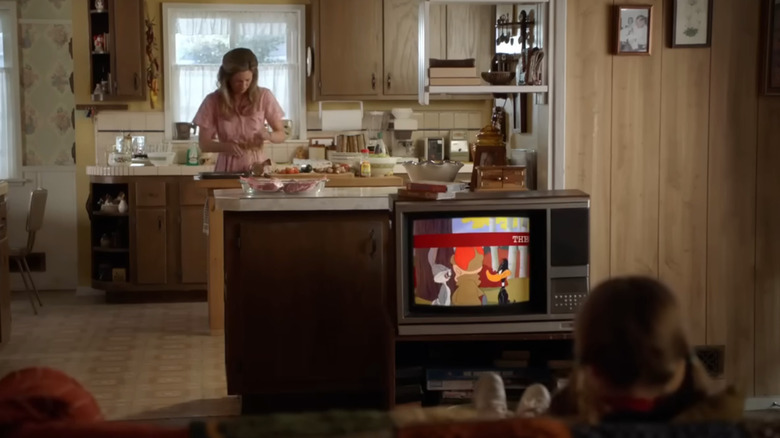Why Young Sheldon Faced A Costly FCC Fine
"Young Sheldon" might not be commonly thought of as a boundary-pushing show, but every once in a while it gets itself into trouble. You may think the most controversial thing it did was have 17-year-old Georgie get 29-year-old Mandy pregnant, but as far as the FCC is concerned its biggest sin came four seasons earlier. In season 1's "A Mother, A Child, and a Blue Man's Backside," Missy (Raegan Revord) is watching TV when a tornado-watch alert goes off. The episode uses a pretty realistic alert sound for the scene, which the FCC found irresponsible. As the committee explained in a statement at the time:
"On April 12, 2018, CBS transmitted an episode of 'Young Sheldon' via at least 227 television stations, including 15 of CBS's owned-and-operated television stations. The episode included a sound effect accompanying a tornado warning, which the producers modified, but still audibly resembled actual EAS tones... CBS's modifications to the EAS tones did not make broadcasting such tones permissible because the audio elements used in the episode were substantially similar to the actual EAS tones."
It's standard for the FCC to issue fines to shows that use the tornado warning sound in non-emergency situations. Around the same time, "The Walking Dead," "Jimmy Kimmel Live!" and "Lone Star Law" were all fined for using emergency alert sounds with no actual emergency present. Per Deadline, "The Walking Dead" was fined $104,000 and "Jimmy Kimmel Live!" was fined $395,000. "Young Sheldon," meanwhile, was hit with a fine of $272,000.
That might seem excessive, but the logic makes sense: the FCC wants to make sure that people only hear the emergency alert sounds when there's an actual emergency, so they know to take it seriously. They also don't want people to mistake the in-story alert for a real one and start to panic.
CBS tried to defend Young Sheldon from the fine
CBS responded to the fine by arguing that the episode was narratively justified in using the sound. They described it as an "integral part of the storyline about a family's visceral reaction to a life‐threatening emergency." It's a reasonable excuse, especially considering the scene after the alert hits is one the more intense and emotional scenes season 1 had to offer. They also shed some light on exactly how they modified the sound for the show. As InsideRadio reported:
"The producers of the show achieved the effect by downloading an EAS tone from YouTube and then altering it for the program. CBS also says it passed the edited tone through three quality control rooms equipped with EAS decoders to prescreen the episode to make sure it didn't trigger a real alert. And the show's dialogue was also used to obscure some elements of the supposed alert."
The FCC seemed unswayed, however, and chose to keep the fine intact. Luckily for CBS, the massive viewership for "Young Sheldon" meant the show was more than profitable enough to cover the bill. The "Big Bang Theory" spinoff averaged 16 million viewers in its first season, and never dropped below an average of 9 million viewers throughout its seven-season run. It may not have been the hip cool show that inspired tons of weekly coverage, but it had the sort of dependable audience base that most shows would kill for.
Even though that $272,000 fine wasn't a huge deal for CBS, "Young Sheldon" did avoid using any emergency alert tones throughout the rest of the show. The emergency situations of later seasons tended to be more personal for the Cooper family, like Georgie Sr.'s multiple heart attacks or Missy stealing a truck in season 6. When a tornado did hit again in season 6, the show opted to just have a guy announce it on the radio. The scene ended up being one of the most emotional sequences in the entire show, and this time "Young Sheldon" pulled it off without suffering a six-figure penalty.

